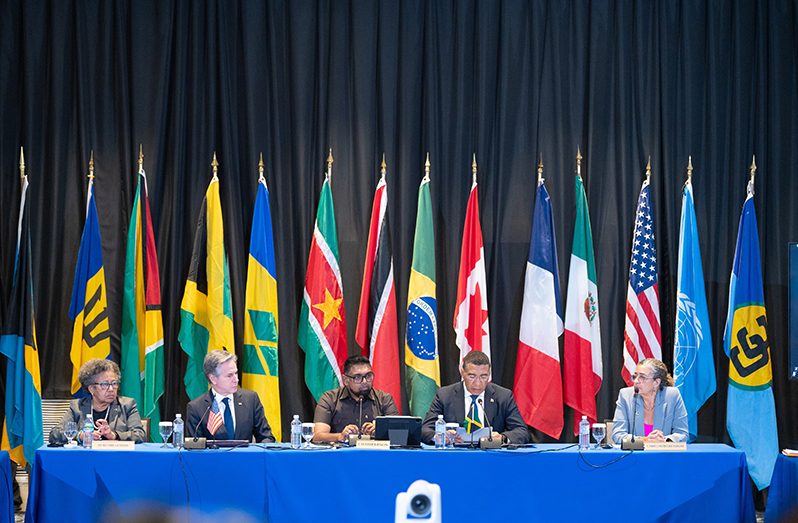–CARICOM Chair says, highlights collaborative efforts with international partners
–as Haiti finalises establishment of transitional council
THROUGH collaborative efforts, the Caribbean Community (CARICOM) continues to be a key stakeholder in lobbying support for Haiti amid its humanitarian crisis.
CARICOM’S current Chairman and Guyana’s President, Dr. Irfaan Ali, said that leaders of the 15-member regional bloc have spent the last eight weeks in frank engagements.
“CARICOM is doing all that we can do. We have limitations, limitation by scale, limitation by size, limitation by resources,” the CARICOM Chair said during an interview with Trinidad and Tobago’s CNC 3 Morning Show, on Monday.
He added: “The US [United States] and all the other stakeholders have been joining us, working on finding a solution, but we know that the challenge ahead of us would be resourcing the intervention, getting the resources that are necessary to finance the intervention.”
According to reports coming out of Port-au-Prince, Haiti’s capital, stakeholders there have finalised an agreement for the establishment of a Presidential Transitional Council.
“[What] we have done so far is to encourage Haiti to own the solution, Haiti to lead a solution and we are working aggressively with Haiti on this, all its stakeholders,” the CARICOM Chair said.
Back in March, Haiti’s Prime Minister Ariel Henry had resigned, paving the way for the establishment of a new transitional governance council.
Henry’s resignation came after the CARICOM Chair led meetings with several other regional leaders and international partners to address the increased waves of violence in the member state.
During those engagements, several pledges of support were made. US Secretary of State Antony Blinken announced that the United States’ Department of Defence will double its support for a multinational security mission from US$100 million to US$200 million; this will bring the monetary pledge to US$300 million.
Apart from this, the US has also pledged US$33 million for humanitarian aid.
While these pledges have been made, the CARICOM Chair highlighted that much more will be needed to not only support the country during its current affairs, but in the long term in the rebuilding of a nation.
“Whilst yes, we all have a responsibility to our citizens, we also have a responsibility to addressing [sic] the wider issues that are connected with Haiti,” he said.
President Ali noted that support for the country will need to go beyond the establishment of the council.
“We have all been working to ensure that this Haitian-led solution, Haitian-owned solution does not end and a Presidential Council does not end at the appointment of a new prime minister.
That is when the support system must kick in, that is when the resources to ensure that the support system work will be critically needed and we do not want to be at a point when we get there that we don’t have the mechanism to support what is being built,” Dr Ali said.
Back in March, international news reports had stated that heavily armed gangs attempted to take over Haiti’s main international airport, exchanging gunfire with police and soldiers in the most recent attack on important government locations in a wave of violence that also included a mass escape from the nation’s two largest prisons.
In February, a collective decision determined that the regional bloc will take the lead in conducting a needs assessment to support the significant advancement in hosting elections in Haiti.
Leaders recently converged in Guyana for the 46th Regular Meeting of the Conference of CARICOM Heads of Government.
Confidential meetings were conducted with Henry, who participated in the extended four-day summit.
At that meeting, it was revealed that a consensus was met for democratic elections to be held in the French-speaking state by August 2025.



.jpg)








